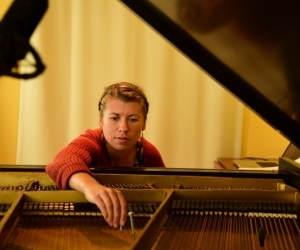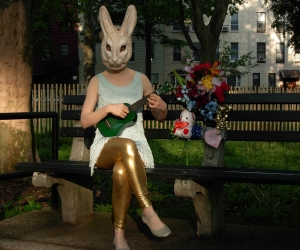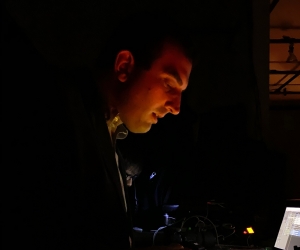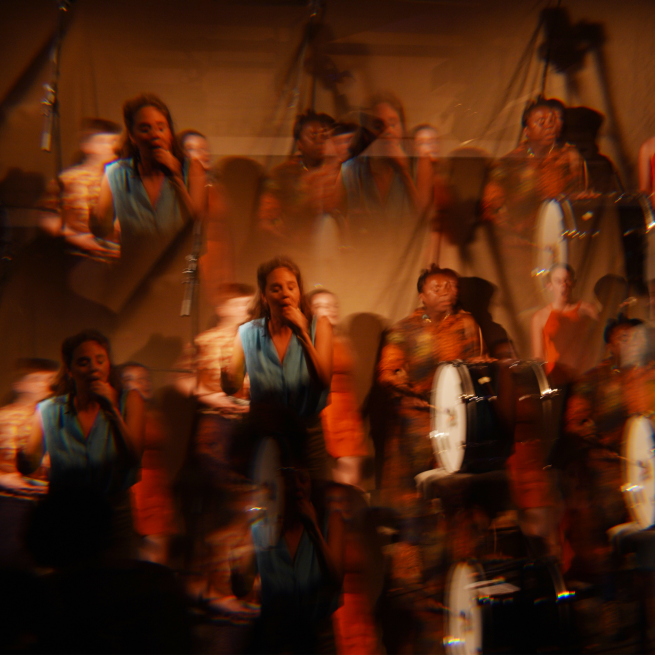
The first intimation that Jenny Moore has arrived at the music room at The Victoria, a historic pub in East London, is when the crowd slowly starts to part. The six members of her ensemble Mystic Business are doing a slow stomp, each hitting a pair of Boomwhacker tubes against each other to produce pitched, rhythmical sounds. Singing in unison as they circle through the audience, the musicians finally reach the stage and pick up their instruments: percussion, keyboards, bass. The Sunday afternoon audience—all two hundred or so, most of them visibly, rejoicingly queer—crowds to the front.
Composer, queer choral leader, and transplant to London from Winnipeg, Jenny Moore specializes in using music, sound, and ritual to make communities. Her carefully created, often multidisciplinary performances have been called Dada-punk and R&B-inspired choral anarchy. The communities her music embraces are those that she refers to as her queer family: feminists, LGBTQ+ people, and their allies. As the audience response indicates, Mystic Business is clearly doing something that resonates with many who feel, for one reason or another, cut off from musical expressions. Moore’s other outfit, F*Choir (the f might mean feminist—“Nobody knows!” Moore says gleefully), has a long waiting list of people eager to join. Invariably, she says, one of the main responses from audiences and participants alike is: “How do we sign up for this cult?”
Mystic Business, like F*Choir, specializes in a direct, tonal music that is deeply, tribally performative. “Tear Things Up,” the song the band played as it entered the Victoria, is typical. A strong rhythmical element underpins unison singing that deliberately shifts in and out of phase, before returning to a resolution. “We tear things up as we go around . . . we speed things up”: the subject of this song can be construed simply as one of generating energy for creative change. Other songs tackle the lived experience of women and of the queer community (“I Am Afraid”) or inveigh against those who envisage a world in which success is measured only in dollars (“He Earns Enough”). The serious themes are all delivered with a grace and dynamism that makes witnessing the songs thrilling. Mystic Business’s video for “He Earns Enough” typifies Moore’s interest in creating music that honours both the collective spirit of the band and the players’ individuation. As the song progresses, the singers make hand movements that signal their pitches and tempi, a form of self-conducting. Such gestural vocabulary is necessary, for the band members bring a rich variety of skill sets to their stagecraft: Rubie Green is a musician and artist; Louise O’Connor is an animator; Jenny Be’s background includes Edinburgh’s Rhubaba Choir; Rachel Barreda Horwood is an illustrator with a string of musical ventures; and choreographer Nandi Bhebhe appeared as the wild and rugged Yorkshire moor in the National Theatre’s recent production of Wuthering Heights.
Moore started out as a fine artist before being called back to a fundamental idea of community that first surfaced in her “secret music background,” the Canadian Baptist church. Her grandfather had been a travelling evangelist and Moore and her siblings, like their parents, grew up in the rhythms of the church. Originally from Toronto, the family moved to Winnipeg when her father, who’d played in Christian rock bands, took a job as a church youth worker. Moore started on the guitar at age twelve and was soon performing for the church congregation; at home, she was writing “angry folk songs, girl songs.” The church had a kit room filled with instruments: Moore and her friends were soon forming teenage punk combos and testing out sounds, and driving round to punk gigs and mosh pits, unbeknown to the adults. “That was a subversive twist,” she says.
Her introduction to a bigger and more complex world came via music that a friend played for her. “Ani DiFranco was my bisexual dream!” Moore says of the American singer-songwriter and activist, who has released more than twenty albums since her 1990 debut. “She was a key. She was the first glimpse that I had into a music written by a younger woman, one with opinion and talking about actual issues. Until that point, so much of what I was thinking—what it is to be a girl, a woman, for example—was tied up in an evangelical Christian culture. It was bonkers. It was a tense time for me.”
After receiving a BFA from the School of Art at the University of Manitoba in Winnipeg, Moore struck out for London in 2007 to pursue a Master of Arts, fuelled by a desire to immerse herself in an arts scene larger than the one she’d left behind. The art department at Goldsmiths, University of London had by then become (in)famous as the main breeding ground of the Young British Artists (YBAs), which emerged in the late 1980s, and the legacy of their work—confrontational, highly theorized, and aggressively marketed—hovered still.
Moore recalls the “crit session” (a regular class in which students present their work) when things started to go wrong. A few days earlier at a friend’s scratch night (outlet for artists to try out works in development), Moore had set up a loop pedal and a mike to sing with herself and build up textures, mesmerizing the audience with her sonic environments. “It felt so good,” she recalls. “I was back in the liveness of an event and had found a way to test my own performative ideas, which I felt that I’d buried for so long.” She decided to reprise the performance for her class. “There were ten or so people in a little semicircle. I finished the performance and . . . silence. Finally, someone said, ‘So . . . I’m interested in, like, the aesthetics of this black box, and this black line that connects to it. What’s this about?’ ‘That’s just the amp,’ I said, ‘and that’s the power cable.’ The guy pressed on. ‘All this technology—are you making some cyber-feminism comment?’
“I wanted to die. I always felt like I had imposter syndrome, that I was some weird, small-town kid who was too earnest and cared too much about things.”
No one had picked up that a performance had happened in front of them, that a voice had sounded, that a text had been created. Crushed, Moore responded by spending the rest of her degree building sculptures—“big sculptures!”—and keeping music as a private passion. Recovery took time. “I’d made this big move [from Canada] across the world to be an artist—’Goodbye, everyone!’ It took time to step away from the pressure of the M.A. I finally asked myself, ‘What do you actually want, Jenny? What’s important to you?’
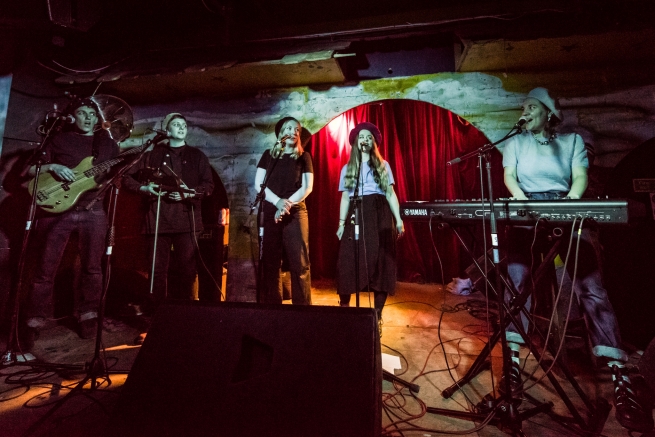
Moore’s sonic practice was inspired by Pauline Oliveros’s Sonic Meditations, a practice that helped Moore “learn in public” about listening and interacting with others. Multiple musical groupings followed her trio Charismatic Megafauna—the members all played a single drum kit—which was active from 2012 to 2021. Mystic Business, which started in Cambridge at the 2016 Wysing Polyphonic festival of music and sound, is more of a straightforward band. sF*Choir, now forty strong, started in 2017, almost by accident, as the result of a voice workshop which participants didn’t want to end; in this, it is perhaps reminiscent of The Gathering, the large improvising choir that Maggie Nicols founded and that has been meeting in London for the past forty years, or Phil Minton’s Feral Choir, another long-standing project based on improv.
“F*Choir is about the practice of gathering,” Moore says. “It has taught me a lot about myself, as well as about how important it is to practice. Not just to rehearse music, but to practice singing, movements, or to practice making noise together. Because it also gives me and gives people opportunities to make noises that they don’t make in rehearsal.”
Mindful that many organizations have, historically, been unwelcoming to LGBTQ+ communities, Moore enacts rituals to neutralize the spaces in which they work. The choir currently rehearses in a church hall. “I go [there] early to cast a little witch spell over the room so that it’s safe for everyone to come in,” she laughs. Water is sometimes involved, as are sweet-smelling things. “I use an organic geranium hand balm. I might lie on the floor and do the Oliveros meditation where you choose one word, and say it really, really, slowly, and then speed it up. Then I sing a tune by Batya Levine—she’s a queer Jewish songwriter—that goes: ‘We are good, we are flawed, we are the breath of an imperfect god.’ I just love it. It’s my vibe.
“I know the lingo of the church,” Moore says, referring to her early years, “and I am desperate to liberate this language.”
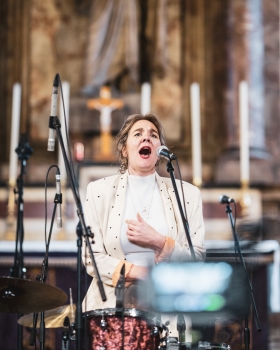
After graduating from Goldsmiths, Moore’s political and social education became bound up with and in the minutiae of living. Her struggle to obtain legal status in the U.K. affected her ability to travel. “It significantly affected my ability to stay connected to Canada, and I was sad about it,” she says. “One of the things I want to do is to understand myself in the context of being a Canadian artist.” Moore is now moving closer to that goal with a large collaborative production, Wild Mix (working title), that has received funding from the Canada Council and is currently being workshopped with British-Rwandan musician and sound artist Tanya Auclair, in addition to colleagues drawn from F*Choir and Mystic Business.
“Wild Mix is a mythological story of its own making, albeit one with kickboxing drummers,” Moore explains. “It is based around a very Canadian idea of a lake—there’s lots of moisture—and it is written as like an origin story.
“It takes this idea of—if you want to imagine a future, can you also imagine a past in order to make that future? It’s an enterprise in which people are singing themselves back to life. I’m just trying to get people to feel alive.”
PHOTOS: Top photo by Sophie Le Roux. Middle photo by Jon Mo. Bottom photo by Michael Jones.
FYI: Jenny Moore’s Mystic Business’s EP He Earns Enough (vinyl and download) is available on Bandcamp. Her Piano Tapes Vol. 1 (cassette and download) will be released in early summer 2022.
ON THE CD: Marshmallow Root; He Earns Enough
